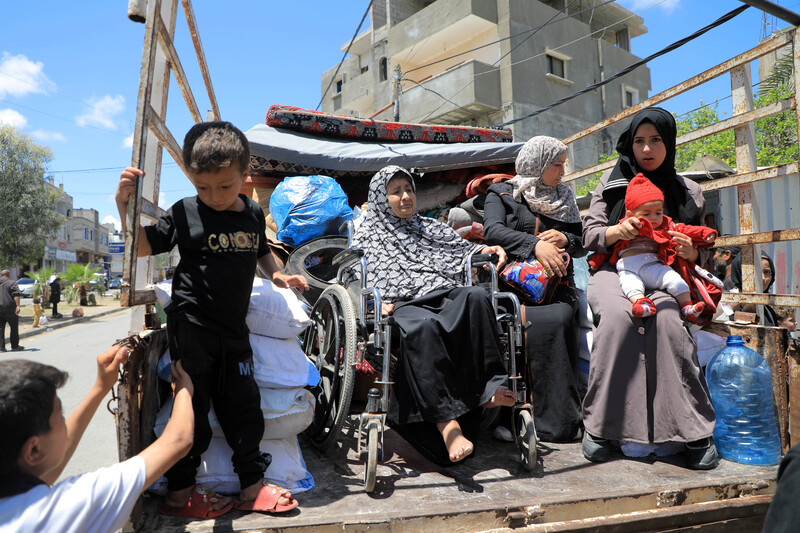The Electronic Intifada 7 May 2024

Israel ordered families to flee parts of Rafah before invading the city.
APA imagesKhalil Mahmoud and his family had to leave their home in northern Gaza during the earlier stages of the current war. They moved to Rafah in the south following Israel’s assurances that it was a safe zone.
In Rafah, they found accommodation with relatives. On Monday, they had to flee from there after Israel dropped leaflets on the eastern part of Rafah, ordering a mass evacuation.
Approximately 100,000 people were instructed to flee. Later on Monday, Israel’s troops invaded the area around the Rafah crossing, which separates Gaza from Egypt.
Khalil’s mother was making tea on a wood fire when she saw one of the leaflets around 8 am on Monday. She was shocked to realize it was an evacuation order.
For the next two hours, Khalil and his father contacted relatives and friends in the cities of Khan Younis and Deir al-Balah. They asked for help in finding somewhere they could stay.
The family were shocked to discover that renting accommodation in those cities would cost between $1,500 and $2,000 per month.
So they decided they would have to live in a tent.
Khalil had been given a tent by a charity when his family moved to Rafah. He had kept it in case the family would have no other accommodation.
The family hired a donkey-drawn cart so they could transport their belongings. It cost them $100.
Finding somewhere to pitch a tent was an ordeal.
Eventually, the family opted to separate.
Some of them went to stay with relatives in Rafah. The relatives lived in a different part of the city that has so far not been covered by an evacuation order.
Others, including Khalil, have gone to al-Mawasi, a small area in southern Gaza. They are now in a tent.
“We are exhausted”
Amany Ribhi and her mother were uprooted from their home in Jabaliya refugee camp, northern Gaza, several months ago.
They took shelter at Nasser Medical Complex in Khan Younis. It was later attacked by Israeli forces.
So Amany and her mother moved to Rafah, where they have been living in a tent. The tent was set up in the grounds of another hospital.
On Monday, Amany was woken up by the noise of a man shouting at people in tents. The man informed them about Israel’s evacuation orders.
Amany tried calling her brother Ihab, who is living in a tent in another part of Rafah. She could not get through to him, so she sent him a message on WhatsApp.
As Ihab did not have a phone signal, he did not see the message until around 11 am.
Once he saw the message, Ihab told Amany that he would come to meet her.
While Amany was waiting for him, Israel attacked one of the neighborhoods it had threatened in the orders. Dozens of injured people started arriving at the hospital where Amany’s tent was located.
It took a long time before Ihab turned up as he struggled to find transportation. Eventually, he was able to hire a donkey-drawn cart.
Ihab brought Amany and their mother back to his tent. He had to find somewhere more suitable for their mother as she has a back complaint.
Her pain becomes acute if she has to sleep on the ground.
Ihab called another sister Olfat, who lives closer to Khan Younis. At first Olfat recommended that her mother should go to her home by car.
But Olfat pointed out that the area in which she lives was under Israeli bombardment.
It took another two hours before Ihab found a taxi. The fare cost $200.
He was nonetheless relieved that his mother and Amany found a place in which to shelter.
Amany and her mother saw vast numbers of people fleeing Rafah. Some were walking, others on carts.
Some were in cars or trucks.
Children – often in tears – were being carried on the shoulders or backs of adults. Some fathers were angry and started shouting at their children in desperation.
Many other people had nowhere to go. They were sitting on sidewalks.
“I pray to God that this is our last displacement,” Amany said. “We are exhausted.”
She yearns for a return to the family’s home in northern Gaza. “We just want to survive this war,” she said.
Ismail Samir, 25, has been living recently with his parents and seven siblings in Rafah. They have been staying in a tent made from nylon.
The family have been uprooted from Sheikh Radwan, an area of Gaza City to which Israel has laid waste.
Early on Monday morning, a friend phoned Ismail with news about the evacuation order.
He woke up his family and they began calling friends and relatives in various parts of southern and central Gaza. But they were unable to find any accommodation.
After eight hours, all they could find was a flat to rent. It would cost $700 per month – a sum the family cannot afford.
“So we have no option than to stay in our tent here in Rafah,” Ismail said.
“We have nowhere else to go. We don’t know if we will be alive tomorrow.”
Khuloud Rabah Sulaiman is a journalist living in Gaza.







